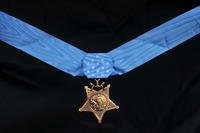Legendary documentary filmmaker Ken Burns once called the Civil War "the most important event in American history," because it's "an unbelievable guide to who we are." The Revolutionary War is important, but in a different way.
"Once you have a country, there's no event more important," he clarified to Military.com. "But 'The American Revolution' is the story of how we got a country."
Burns, of course, has already covered the Civil War over the course of his career. He's also made films about World War II and the Vietnam War, and explored World War I through his other works, such as "The Roosevelts," "Jazz" and "Baseball." "The American Revolution" is just as big a story to tell, but this time, the challenge is not having photographs or newsreels to draw upon.
Read Next: America's Best Pilots Get the Netflix Documentary Treatment in 'Air Force Elite: Thunderbirds'
"There was a little bit of just wanting that challenge. Remember, less than 1% of people had their portraits painted, but that doesn't mean you're nobody," Burns said. "More than anything, I felt like it was time to go back and look at our founding moment, not from a kind of sentimental or nostalgic way. We sort of kept our revolution as if it was an archeological relic encased in amber. We accept the violence of the Civil War and the 20th-century wars that we were involved in, but we don't really admit to ourselves just how violent and bloody a civil war our revolution actually was."
Burns wondered whether the reason we don't acknowledge the violent nature of the American Revolution was because we worry the ideas that came from it might be diminished in some way. He believes, however, the ideas are more inspirational, because the success of the revolution was such a long shot.
"At Lexington Green, the odds of success are zero," he said. "There's nobody that would've placed a bet on the Patriots winning. So I think it's a wonderful story. We've also tended to make our founding fathers and mothers kind of inaccessible -- like they're marble statues. To give them dimension and restore their humanity is exhilarating."
Burns tells the story not only from the points of view of those towering figures of American history, but also a cast of hundreds, such as a 14-year-old fifer from Boston, a 15-year-old Continental soldier from Connecticut and a young girl from Yorktown who's 10 to 16 during the main part of the war, a girl whose well-to-do family is suddenly turned into refugees. The characters in "The American Revolution" are voiced by what the director calls "the greatest cast list in the history of streamers, or premium cable or broadcast television ever."
"On addition to our third-person narrator reading the script that Geoffrey Ward wrote, which is read by Peter Coyote, we also have a chorus of first-person voices read by the greatest cast list. I kid you not -- I'm not exaggerating -- of any Hollywood film or any series ever. There's Tom Hanks and Meryl Streep and Morgan Freeman and Samuel L. Jackson and Kenneth Branagh and Dom Gleeson and Laura Linney and Paul Giamatti and Mandy Patinkin and Liev Schreiber and Matthew Rhys, and I mean, I could go on and on and on. All of whom read off-camera voices that help bring to life the characters."
Burns let it be known that Paul Giamatti (who played John Adams in the HBO miniseries "John Adams") would once again voice Adams, a role he also reprised in another Ken Burns film, but Laura Linney would not be reprising Abigail, his wife. He assured readers that Claire Danes ("Homeland") is an excellent Abigail Adams. Also joining the cast are David Oyelowo ("Selma"), Damian Lewis ("Band of Brothers"), Jeff Daniels ("The Newsroom"), Wendell Pierce ("Tom Clancy's Jack Ryan"), Michael Keaton ("Batman"), Josh Brolin ("Avengers: Endgame"), Edward Norton ("Fight Club") and more.

"The biggest challenge is probably from an artistic side of being able to treat the reenactment footage not as something we direct, but something we collect over the course of many, many years," he said. "We then put it into an archival bank as if it were a newsreel. We borrow from all different sorts of shoots to meet the needs of a particular moment, to merge with the paintings, to merge with the documents, to merge with the first-person voices and the on-camera commentary of writers and students of the American Revolution.
"I think it's really also important to understand that making a film like this is not additive in the way you build a house. This is subtractive," he continued. "We have about a 40- or 50-to-one shooting ratio, which means that we've got more than 500 hours of material that has been cut down over the last nine years and six months to the 12 hours. That is our finished film."
"The American Revolution" starts airing on Nov. 16, 2025, on PBS.
Keep Up With the Best in Military Entertainment
Whether you're looking for news and entertainment, thinking of joining the military or keeping up with military life and benefits, Military.com has you covered. Subscribe to the Military.com newsletter to have military news, updates and resources delivered straight to your inbox.

















